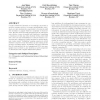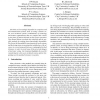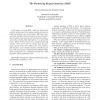687 search results - page 27 / 138 » On The Complexity of Manipulating Elections |
ICRA
2008
IEEE
14 years 2 months ago
2008
IEEE
— We investigate modeling and recognition of object manipulation actions for the purpose of imitation based learning in robotics. To model the process, we are using a combination...
SIGCSE
2009
ACM
14 years 8 months ago
2009
ACM
Complex distributed systems are increasingly important in modern computer science, yet many undergraduate curricula do not give students the opportunity to develop the skill sets ...
IEEEARES
2006
IEEE
14 years 1 months ago
2006
IEEE
Elections are increasingly dependent on computers and telecommunication systems. Such “E-voting” schemes create socio-technical systems (combinations of technology and human o...
IPPS
2006
IEEE
14 years 1 months ago
2006
IEEE
In this paper we present MRI, a high level interface for selective monitoring of code regions and data structures in single and multiprocessor environments. MRI keeps transparent ...
SPDP
1993
IEEE
14 years 15 hour ago
1993
IEEE
This paper presents a solution to the (processor) group membership problem. The methodology followed in designing the algorithm is summarized by the option to optimize the perform...



